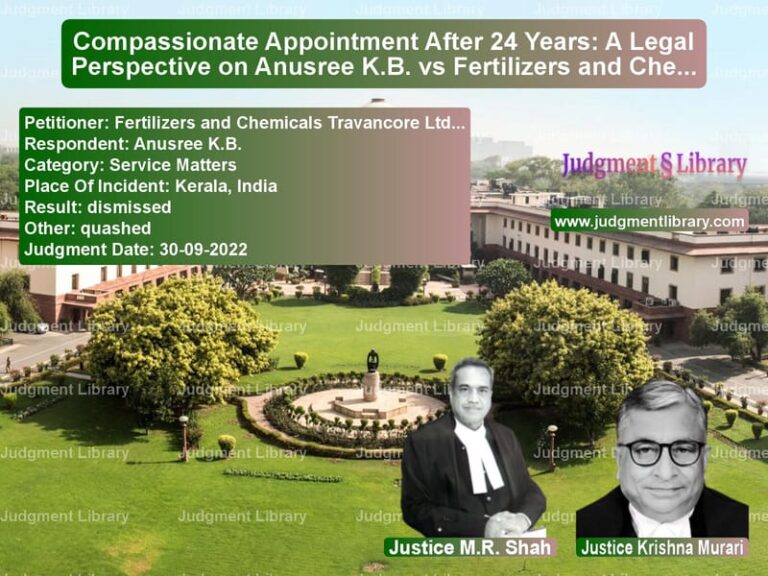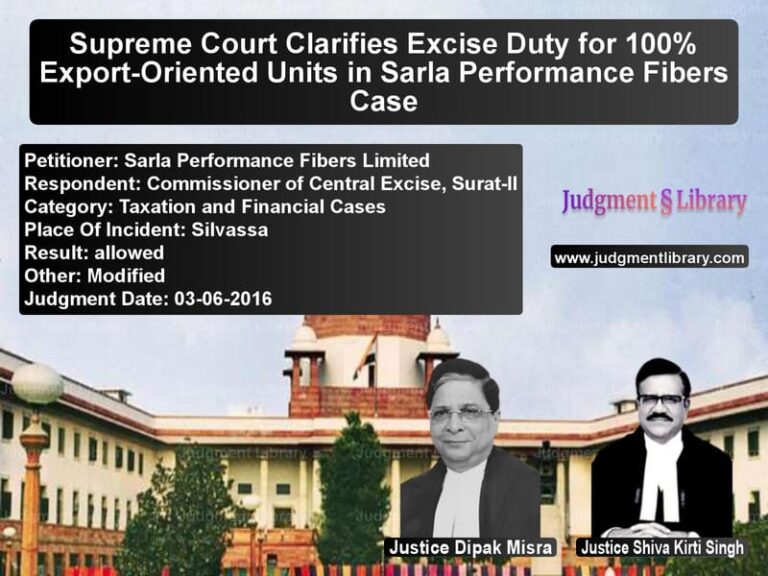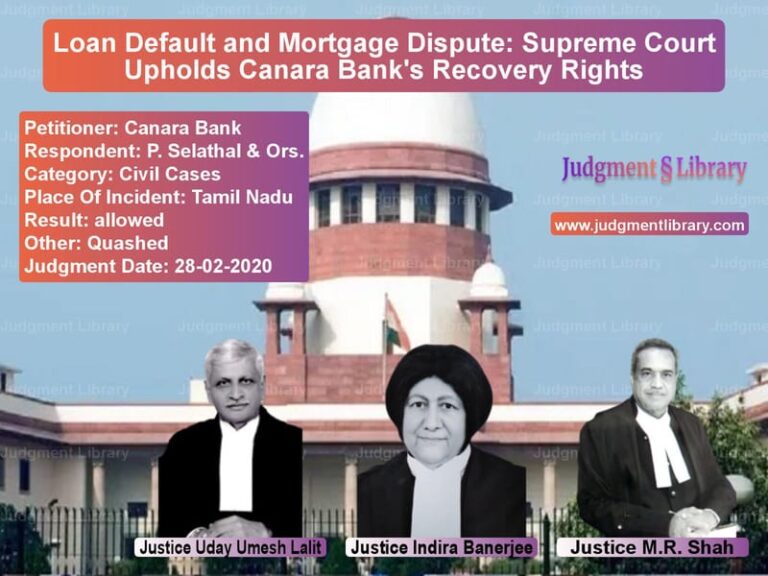Jaibunisha vs. Meherban: Supreme Court Cancels Bail in Murder Case
The case of Jaibunisha vs. Meherban & Ors. concerns a dispute over the grant of bail in a murder case. The Supreme Court examined the legality of bail orders issued by the Allahabad High Court, ultimately ruling that the bail granted to the accused was unjustified and should be revoked. The Court emphasized that granting bail in a serious criminal case without proper reasoning could adversely impact the justice system.
Background of the Case
The appellant, Jaibunisha, is the mother of the deceased, Yameen. On August 27, 2018, she filed an FIR at Sardhana Police Station in Meerut, Uttar Pradesh, alleging that a group of accused persons had attacked her family members with swords and knives, resulting in the death of her son Yameen and serious injuries to her other son, Mobin, and husband, Jamshed.
The FIR named eleven accused persons, including:
- Meherban (Respondent in Criminal Appeal No. 76/2022)
- Jumma, Hakmeen, Yaseen, Arshad, and Firoz (Respondents in Criminal Appeal No. 77/2022)
- Five other accused persons: Bhoora, Shahid, Sullad, Yamin, and Dev
Following the investigation, the police filed a charge sheet against only three individuals—Sullad, Bhoora alias Shadab, and Yamin. The remaining accused were not charge-sheeted initially, leading to a legal battle over their involvement in the crime.
Petitioner’s Arguments
The appellant, represented by Ronak Karanpuria, contended that:
- The accused had deliberately evaded arrest and ignored multiple judicial orders directing them to appear before the trial court.
- The accused were absconding for over three months before their arrest.
- Despite the gravity of the charges—including murder (Section 302 IPC), attempt to murder (Section 307 IPC), and other violent offenses—the High Court granted bail without providing any substantial reasoning.
- The possibility of the accused tampering with evidence and influencing witnesses was high.
- The bail orders were arbitrary, lacking any reference to the severity of the crime.
Respondents’ Arguments
The accused, represented by Kanishka Prasad, countered that:
- The FIR was lodged with a biased motive to falsely implicate them.
- There was a scuffle between both parties on the day of the incident, and four of the accused also sustained injuries.
- A separate FIR was registered against the appellant’s family members in relation to the incident.
- They had no criminal antecedents and should be granted bail.
Key Observations of the Supreme Court
A bench comprising Justice M.R. Shah and Justice B.V. Nagarathna made the following critical observations:
- The accused had consistently avoided judicial proceedings and refused to surrender despite multiple court orders.
- The trial court had issued Non-Bailable Warrants (NBWs) and proclamations under Section 82 of CrPC due to the accused being absconders.
- The High Court failed to consider the severity of the allegations before granting bail.
- The Supreme Court reiterated that bail should not be granted in a casual manner, especially in serious criminal cases.
- The High Court’s bail orders were cryptic and lacked detailed reasoning.
Final Judgment
The Supreme Court ruled:
- The bail granted to the accused was canceled.
- The accused were directed to surrender within two weeks.
- The trial court was directed to proceed with the case without undue delay.
- The judgment reaffirmed that courts must apply judicial discretion cautiously in bail matters.
Implications of the Judgment
The ruling has significant legal implications:
- Stringent Bail Conditions: Courts must provide valid reasons for granting bail, especially in grave offenses like murder.
- Judicial Accountability: High Courts must ensure that bail orders are well-reasoned and consider all relevant factors.
- Ensuring Fair Trials: The decision strengthens the prosecution’s ability to conduct a fair trial without undue interference.
- Precedent for Future Cases: The ruling will guide lower courts in deciding bail applications in serious criminal matters.
Conclusion
The case of Jaibunisha vs. Meherban & Ors. underscores the importance of a cautious approach in granting bail for serious crimes. The Supreme Court’s intervention ensured that the accused, who were facing grave charges and had evaded judicial proceedings, could not misuse bail provisions. The ruling reinforces the need for judicial accountability and a balanced approach to bail decisions.
Read also: https://judgmentlibrary.com/supreme-court-commutes-death-sentence-in-child-rape-and-murder-case-2/
Petitioner Name: Jaibunisha.Respondent Name: Meherban & Ors..Judgment By: Justice M.R. Shah, Justice B.V. Nagarathna.Place Of Incident: Meerut, Uttar Pradesh.Judgment Date: 18-01-2022.
Don’t miss out on the full details! Download the complete judgment in PDF format below and gain valuable insights instantly!
Download Judgment: jaibunisha-vs-meherban-&-ors.-supreme-court-of-india-judgment-dated-18-01-2022.pdf
Directly Download Judgment: Directly download this Judgment
See all petitions in Bail and Anticipatory Bail
See all petitions in Attempt to Murder Cases
See all petitions in Murder Cases
See all petitions in Judgment by Mukeshkumar Rasikbhai Shah
See all petitions in Judgment by B.V. Nagarathna
See all petitions in allowed
See all petitions in Cancelled
See all petitions in supreme court of India judgments January 2022
See all petitions in 2022 judgments
See all posts in Criminal Cases Category
See all allowed petitions in Criminal Cases Category
See all Dismissed petitions in Criminal Cases Category
See all partially allowed petitions in Criminal Cases Category







